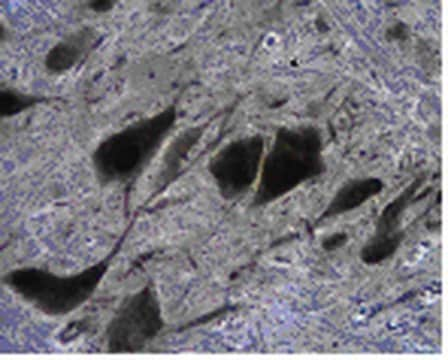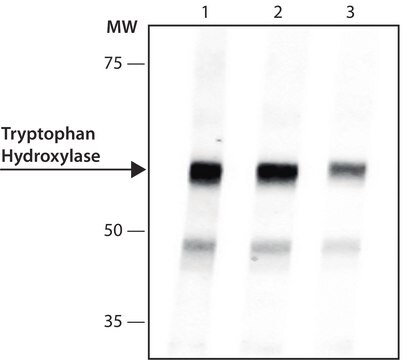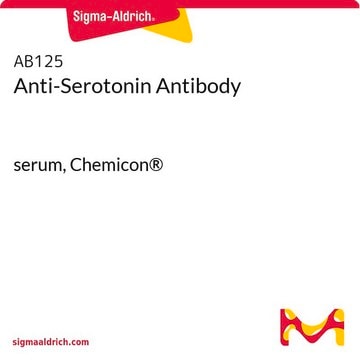Transportation information can be found in Section 14 of the product's (M)SDS.To access the shipping information for this material, use the link on the product detail page for the product.
Wichtige Dokumente
T0678
Anti-Tryptophan Hydroxylase Antibody
mouse monoclonal, WH-3
Synonym(e):
Anti-TPH
Größe auswählen
CHF 506.00
Voraussichtliches Versanddatum12. Mai 2025
Größe auswählen
About This Item
CHF 506.00
Voraussichtliches Versanddatum12. Mai 2025
Empfohlene Produkte
Produktbezeichnung
Monoclonal Anti-Tryptophan Hydroxylase antibody produced in mouse, clone WH-3, ascites fluid
Biologische Quelle
mouse
Qualitätsniveau
Konjugat
unconjugated
Antikörperform
ascites fluid
Antikörper-Produkttyp
primary antibodies
Klon
WH-3, monoclonal
Mol-Gew.
antigen 55 kDa
Enthält
15 mM sodium azide
Speziesreaktivität
human, monkey, rabbit, rat
Methode(n)
immunohistochemistry: suitable
indirect ELISA: suitable
microarray: suitable
western blot: 1:1,000 using rabbit pineal gland extract
Isotyp
IgG3
UniProt-Hinterlegungsnummer
Versandbedingung
dry ice
Lagertemp.
−20°C
Posttranslationale Modifikation Target
unmodified
Angaben zum Gen
human ... TPH1(7166) , TPH2(121278)
rat ... Tph1(24848) , Tph2(317675)
Allgemeine Beschreibung
Spezifität
Immunogen
Anwendung
- enzyme-linked immunosorbent assay (ELISA)
- immunohistochemistry
- immunoblot
- immunocytochemistry
Biochem./physiol. Wirkung
Haftungsausschluss
Sie haben nicht das passende Produkt gefunden?
Probieren Sie unser Produkt-Auswahlhilfe. aus.
Empfehlung
Lagerklassenschlüssel
10 - Combustible liquids
WGK
nwg
Flammpunkt (°F)
Not applicable
Flammpunkt (°C)
Not applicable
Hier finden Sie alle aktuellen Versionen:
Analysenzertifikate (COA)
Die passende Version wird nicht angezeigt?
Wenn Sie eine bestimmte Version benötigen, können Sie anhand der Lot- oder Chargennummer nach einem spezifischen Zertifikat suchen.
Besitzen Sie dieses Produkt bereits?
In der Dokumentenbibliothek finden Sie die Dokumentation zu den Produkten, die Sie kürzlich erworben haben.
Kunden haben sich ebenfalls angesehen
-
What is the Department of Transportation shipping information for this product?
1 answer-
Helpful?
-
-
Do you have an immunohistochemistry protocol for use with Product T0678, Monoclonal Anti-Tryptophan Hydroxylase antibody produced in mouse?
1 answer-
Free floating sections (4% paraformaldehyde fixation)1. Incubate 30 minutes at room temperature in 0.3% Triton X-100, 5% normal serum.2. Incubate with the antibody diluted 1:10,000 in PBS, 0.3% Triton X-100, 3.5% normal serum and 0.05% BSA for 36-48 hours.3. Rinse 3 times for 5 minutes each in PBS.4. Add the biotinylated anti-mouse IgG3 diluted in PBS containing 0.3% Triton X-100 and 3.5% normal serum for 1 hour at room temperature.5. Rinse 3 times for 5 minutes each in PBS.6. Process with Avidin Biotin-HRP.7. Complete the reaction with a 2-10 minute incubation in PBS containing 0.05% DAB and 0.015% hydrogen peroxide (H2O2).8. Mount the sections on gel coated slides and air dry.
Helpful?
-
-
Does Product T0678, Monoclonal Anti-Tryptophan Hydroxylase antibody produced in mouse, cross-react with tyrosine or phenylalanine hydroxylases?
1 answer-
This antibody, unlike some other antibodies to tryptophan hydroxylases (WH) in the market, does not cross react with tyrosine hydroxylase (TH) or with phenylalanine hydroxylase (PH). The epitope recognized by the antibody is not located in the Pterin Binding Region, which is homologous among PH, TH and WH. The specificity to WH is confirmed by the single band obtained at the 55KD region, while TH has a higher MW (60-68KD), depending on the submit) and PH has a lower MW. It has also been confirmed by collaborating experts. See Journal of Neuroscience Methods, 114(2), 205-212 (2002).
Helpful?
-
-
Can Product T0678, Monoclonal Anti-Tryptophan Hydroxylase antibody produced in mouse, be used to stain mouse brain sections?
1 answer-
This antibody has been used successfully on mouse brain slices in an immunohistochemical application. The IHC results from an experiment employing T0678 at 1:500 in mouse brain slice staining clearly showed the dorsal nuclear raphe (which are the serotonergic neurons).
Helpful?
-
Active Filters
Unser Team von Wissenschaftlern verfügt über Erfahrung in allen Forschungsbereichen einschließlich Life Science, Materialwissenschaften, chemischer Synthese, Chromatographie, Analytik und vielen mehr..
Setzen Sie sich mit dem technischen Dienst in Verbindung.









